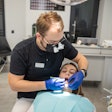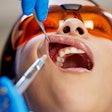Denosumab, an investigational new drug for osteoporosis, increased patients' bone density without causing osteonecrosis of the jaw in a study published online August 11 in the New England Journal of Medicine.
Some research has associated the use of bisphosphonate drugs (such as alendronate sodium, or Fosamax) for osteoporosis with osteonecrosis of the jaw, raising concerns about whether dentists should treat such patients differently.
In this study, funded by the drug's maker, Amgen, researchers from around the world randomly assigned 7,868 women with osteoporosis either to receive 60 mg of denosumab or a placebo subcutaneously every six months for three years.
They found that 7.2% of the women taking the placebo had a radiographic vertebral fracture, compared to only 2.3% of the women taking denosumab (p < 0.001). Women taking the drug also had a reduced risk of hip fracture and nonvertebral fracture, as well as an increase in bone mineral density of 9.2% (95% confidence interval, 8.2 to 10.1) at the lumbar spine.
The researchers reported no incidents of osteonecrosis in either group. They planned to continue treating the patients in the trial with denosumab and monitoring them for osteonecrosis and other adverse reactions.
Denosumab, a monoclonal antibody, and bisphosphonates both work by inhibiting osteoclasts from resorbing bone, but by different mechanisms.
The New England Journal of Medicine also published a study on men receiving androgen deprivation therapy for prostate cancer, a group who can suffer symptoms similar to osteoporosis. The study was similarly effective in these men, and no incidence of osteonecrosis was reported.
Copyright © 2009 DrBicuspid.com



















